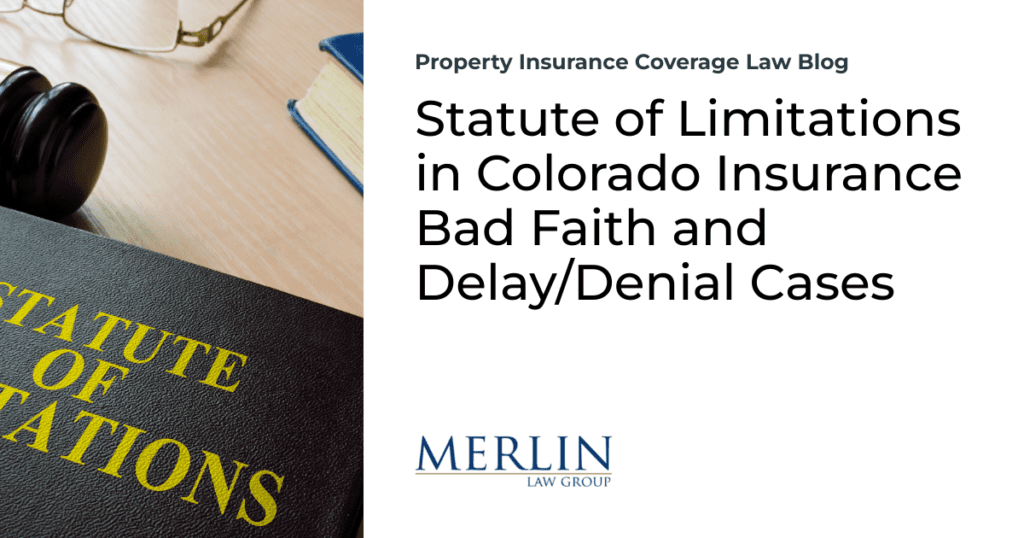Statute of Limitations in Colorado Insurance Bad Faith and Delay/Denial Cases

If an insurance company is unfairly or unreasonably handling your claim, be aware that there are strict deadlines, known as statutes of limitations, by which you must take legal action. In my previous post, Why Time Matters Differently in Colorado for Homeowners, Business Owners, and HOAs, I discussed deadlines for filing a contractual breach of insurance policy lawsuit. In this post, I review the statutory framework establishing the Colorado statute of limitations related to filing a legal action for common law bad faith and unreasonable delay/denial of insurance benefits.
Tortious Breach of Contract (Common Law Bad Faith):
In Colorado, a claim for tortious breach of contract, commonly referred to as “bad faith,” is subject to a two-year statute of limitations under Colorado Revised Statute § 13-80-102.
[Tort actions], regardless of the theory upon which suit is brought, or against whom suit is brought, must be commenced within two years after the cause of action accrues, and not thereafter.
Colorado Revised Statute § 13–80–108(1) specifies that a bad faith cause of action accrues “on the date both the injury and its cause are known or should have been known by the exercise of reasonable diligence.”
[A] cause of action for injury to . . . property. . . shall be considered to accrue on the date both the injury and its cause are known or should have been known by the exercise of reasonable diligence.
Under these two statutes, any action alleging bad faith in the breach of an insurance contract must be initiated within two years from the date the injured party becomes aware, or reasonably should have become aware, of both the injury and its underlying cause.1
Statutory Claims Under §§ 10-3-1115 and 10-3-1116:
The statute of limitations for claims against an insurer for unreasonable delay or denial of insurance benefits under sections 10-3-1115 and 10-3-1116 remains unsettled. In 2018, the Colorado Supreme Court examined the nature of claims under §§ 10-3-1115 and 10-3-1116 to determine whether they should be categorized as “actions for any penalty or forfeiture of any penal statutes.”2 This categorization is significant because, under Colorado Revised Statute § 13-80-103(1)(d), such actions are subject to a more restrictive one-year statute of limitations. The court answered the certified question in the negative, clarifying that the one-year statute of limitations does not govern claims for unreasonable delay or denial of insurance benefits under §§ 10-3-1115 and 10-3-1116.
While there is no binding precedent setting the time limit for filing claims under these statutes, non-binding decisions suggest that these claims are similar to common law bad faith claims.3 Thus, there appears to be a two-year time limit to bring claims arising under §§ 10-3-1115 and 10-3-1116.4 This two-year period commences when both the injury and its cause are known or should have been known by the existence of reasonable diligence.
Navigating Colorado’s statutes of limitations is complex, and missing key deadlines could result in the forfeiture of legal recourse. If you find yourself in need of guidance or have questions about your specific situation, please do not hesitate to contact our office.
1 See Wardcraft Homes, Inc. v. Emps. Mut. Cas. Co., 70 F. Supp. 3d 1198, 1212 (D. Colo. 2014); Cork v. Sentry Ins., 194 P.3d 422 (Colo. App. 2008).
2 Rooftop Restoration, Inc. v. Am. Fam. Mut. Ins. Co., 2018 CO 44, ¶ 17, 418 P.3d 1173, 1178 (2018).
3 See Gargano v. Owners Ins. Co., No. 12–cv–01109, 2014 WL 1032303, at *3 (D.Colo. March 18, 2014); Alarcon v. Am. Fam. Ins. Grp., No. 08–cv–01171, 2010 WL 2541131, at *1 n. 5 (D.Colo. June 18, 2010).
4 Thompson v. State Farm Mut. Auto. Ins. Co., 457 F. Supp. 3d 998, 1007–08 (D. Colo. 2020); 1008 Steeplechase II Condo. Assoc., Inc. v. Travelers Indem. Co., No. 17-cv-01273, 2018 WL 6571392, at *4 (D. Colo. Dec. 13, 2018).



